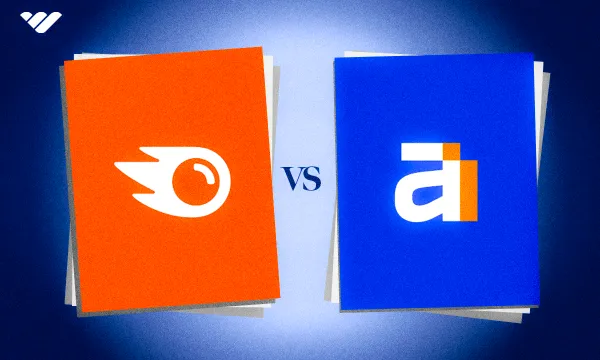Search Engine Optimization (SEO) tools are essential for digital entrepreneurs and creatives. According to Hubspot, there's an estimated 8.5 billion Google searches each day.
Many of these searches are customers looking for products to buy. If you’re not already creating optimized content for search engines, then you could be missing out on a big audience and even bigger sales.
SEO tools help you gain deep insights into popular keywords, competitor strategies, and weak spots in your website’s current SEO. Semrush and Ahrefs are two big names in the SEO industry. But which SEO tool is best for entrepreneurs?
If you’re torn between the two platforms, don’t worry. In this post, we’ll cover everything you need to know about Semrush vs Ahrefs, including everything from features to pricing.
What Is An SEO Tool?
SEO tools help businesses to improve their rankings within search engines like Google. So, when you list a product or write a blog post, it’s likely to appear higher in search results if properly optimized.
While they do vary, SEO tools generally have several core features in common, including:
- Keyword finder tool: You can use this to search for popular keywords for blogs and website content, with details of search volume and ranking difficulty.
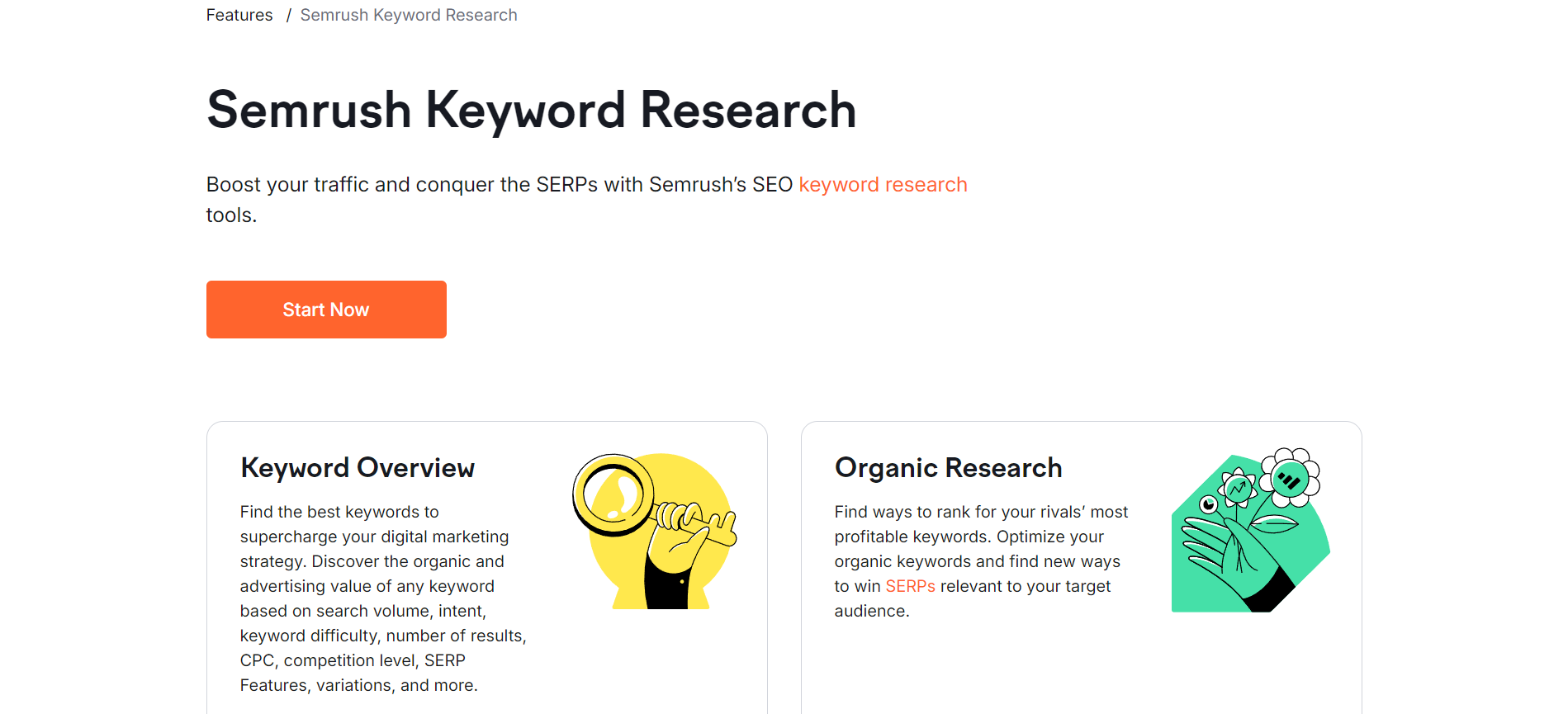
- Rank tracking: SEO tools usually also allow you to track rankings for SEO keywords on your website, so you can see if you move up or down in the rankings.
- SEO audit: This will look for issues with your website that could affect SEO, including website speed and performance, missing title tags and meta descriptions, and more.
Growing Your Brand With Semrush
With over 1 million active, free users and just under 108,000 paid subscribers, Semrush is a marketing icon. The platform has become synonymous with SEO, but is it a good choice for entrepreneurs? Let’s take a look.
Key features of Semrush
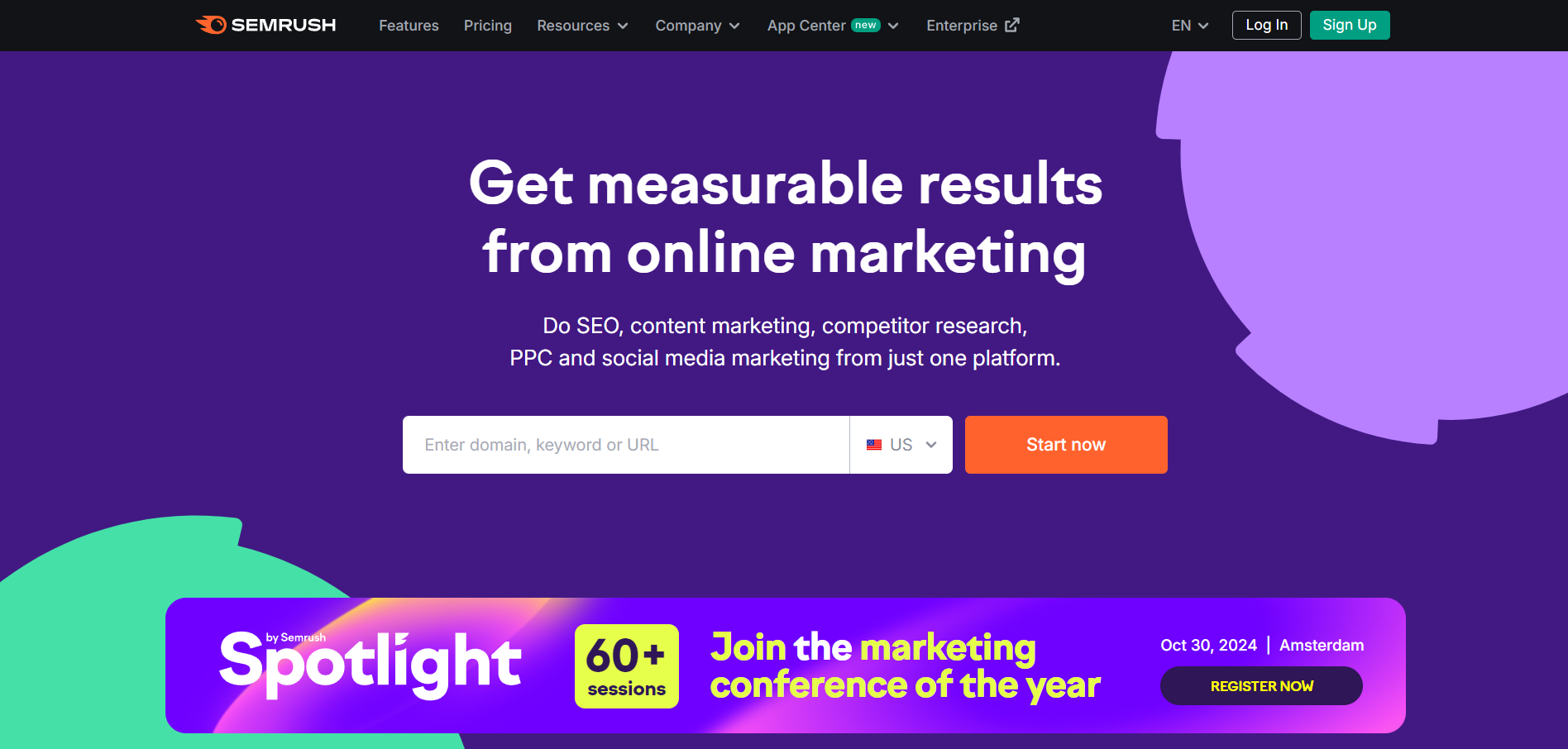
Semrush is a comprehensive online marketing tool. It’s split into several “toolkits”, which focus on different types of marketing, including SEO, social media, paid advertising, and content marketing.
Some toolkits come with Semrush’s monthly paid subscription, while others require an additional paid add-on or plan upgrade.
Key features include:
SEO tools: Conduct research into your top competitors, discover the perfect keywords to boost your blog, along with opportunities for backlinks, and SEO audits to improve your site.
Social marketing: Manage your social media presence, analyze your progress against your competitors, and develop data-led strategies.
Paid ads tools: Discover the right keywords for your PPC campaigns, review the ads of your competitors, and launch your Google ads from Semrush.
Content marketing: Find trending topics to write about in your niche, get detailed briefs on the best keywords, content length, and more for your posts, and automate your editing processes.
Agency Growth Kit: Generate trusted leads as a Semrush Agency Partner. Along with lead generation tools, it also provides you with a client portal, CRM, and reporting tools.
Other toolkits: Semrush also offers a local toolkit for optimizing SEO and Google profiles for local audiences, and Trends, which helps you to stay ahead of industry trends.
AI tools: There are also several AI tools on offer, including ImpactHero, which allows you to analyze each stage of your marketing funnel.
Semrush plans and pricing
Semrush offers four different plans to choose from. Let’s take a look at these now:
- Free plan: Semrush does have a free plan, but keep in mind that this is relatively limited. For example, you can only track up to 10 keywords, which is only likely to cover a few blog pages.
- Pro plan: $139.95 per month (paid monthly) or $117.33 per month (paid annually). This plan includes the platform’s core toolkits, including SEO, social media, advertising, and more. It is still limited though, as you’ll be restricted to 5 projects, 5 scheduled reports, 500 tracked keywords, and 10,000 results in analytics reports.
- Guru plan: $295.95 per month (paid monthly) or $208.33 per month (paid annually). This covers the Pro plan features, as well as unlocking the content marketing tools, historical data, and more. The Guru plan also has more generous limits, enabling 15 projects, 20 scheduled reports, 1,500 tracked keywords, and 30,000 results in analytics reports.
- Business plan: $499.95 per month (paid monthly) or $416.66 per month (paid annually). Includes the features from the previous plans, as well as API access, “Share of Voice” metrics, and enhanced limits. This plan allows 40 projects, 50 scheduled reports, 5,000 tracked keywords, and 50,000 results in analytics reports.
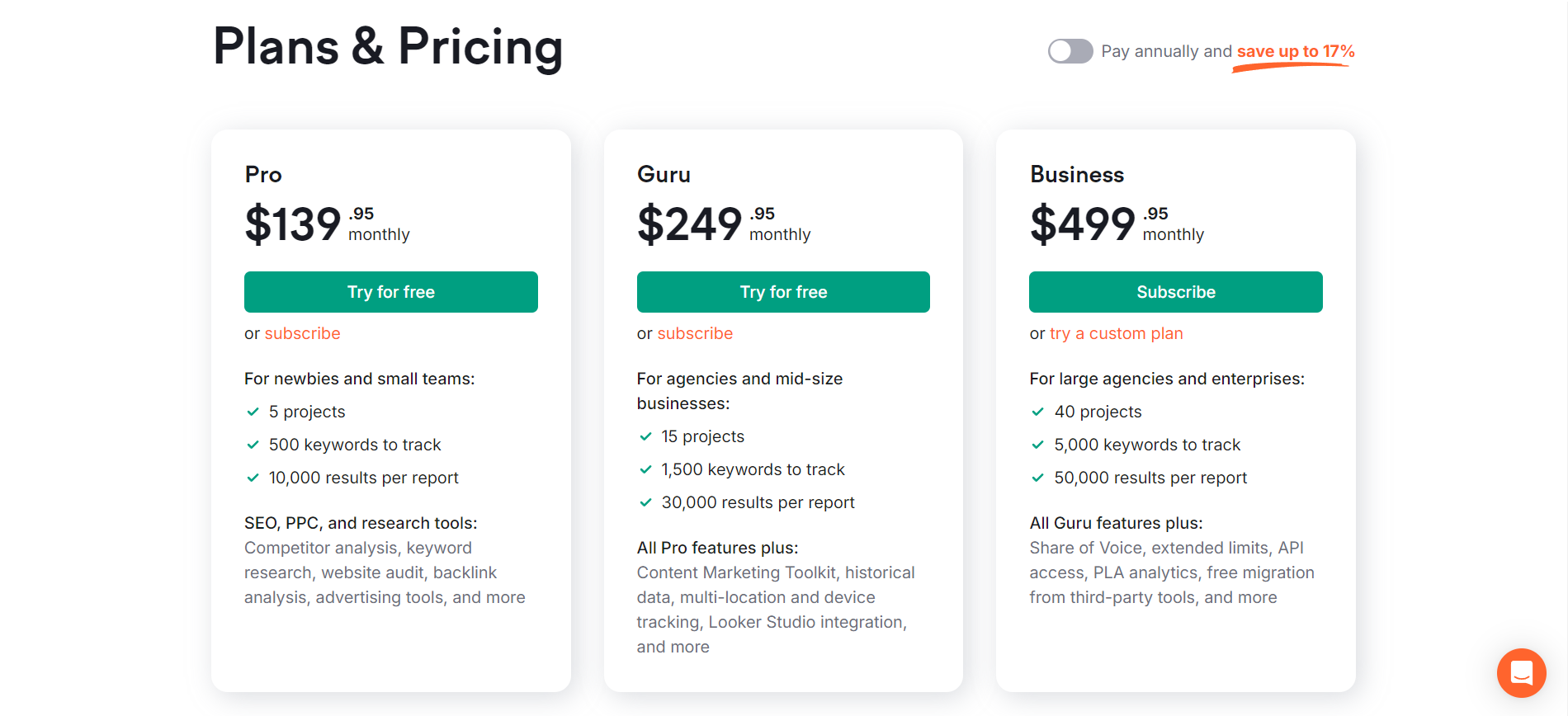
Alternatively, larger brands looking for an Enterprise solution can contact Semrush for a custom plan.
Beyond this, there are additional charges to consider. Aside from the main plans, you’ll need to purchase certain toolkits separately – or you can buy some of them as a standalone subscription. For example, Semrush Local has two plan options, which range from $20 to $40 per month per location.
Additional users will also cost extra, with pricing varying between plans. On the Pro plan, for example, you’ll need to fork out an extra $45 per month per user.
Semrush pros and cons for entrepreneurs
If you’re looking to launch or grow your online business, you need the right tools at your disposal. Is Semrush right for you? Take a look at the pros and cons below.
Pros
- Streamlined platform: Semrush includes a variety of diverse tools on one platform, making it easy for entrepreneurs to scale their business. Positive reviews note the diverse features, as they can take care of their SEO, social media, content, and more from the same dashboard.

- Great keyword and SEO tools: Semrush is famous for its SEO capabilities for a reason. Its keyword tool is renowned for its value and ease-of-use. Customer reviews consistently talk about how helpful these tools are for improving search rankings.

Cons
- Expensive pricing: Even positive Semrush reviews are dissatisfied with the pricing. Whilst businesses appreciate the features, they feel it’s not worth the expense.

- Steep learning curve: Customers also find the platform challenging to learn. For example, this Trustpilot review notes that the learning curve can take a year, which can be highly expensive for smaller brands.
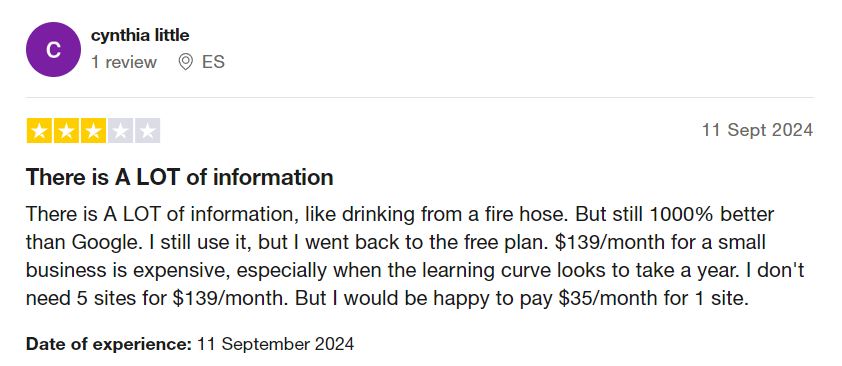
Boosting your SEO with Ahrefs
But Semrush isn’t the only popular SEO platform. According to 6sense, Ahrefs has over 47,000 customers. It’s also a highly profitable brand, reaching $100 million in revenue in 2023 (Get Latka).
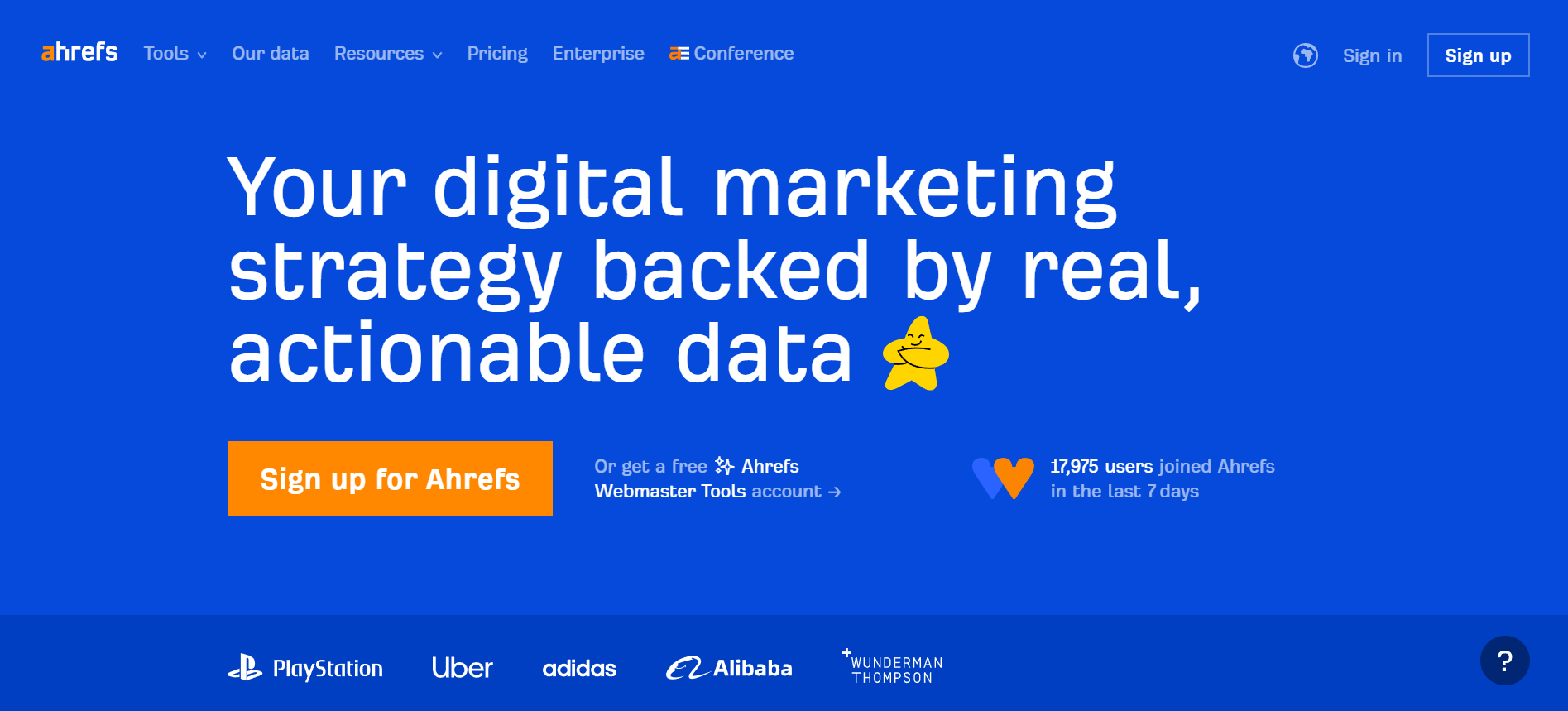
So, how does it differ from Semrush – and is it the better choice?
Ahrefs key features
Ahrefs offers an inclusive package of SEO tools. You can use it to find new keywords, track your ranking in search engines, audit your website for SEO, and much more. However, it doesn’t have all the other tools associated with Semrush, such as the comprehensive social media marketing tool.
SEO Dashboard: Keep track of your SEO progress across multiple projects, and synchronize your data from Google Search Console. Create portfolios of several target URLs to monitor their performance together, which is useful for tracking specific sets of content.
Keywords Explorer: Discover a vast range of keywords, with rich details, including search volume, SERP content, and estimated ranking difficulty. Plus, enjoy tools to help you decide which key phrases to target.
Site Explorer: Review your competitors’ organic and paid traffic, backlinks, and more, with access to historical data.
Content Explorer: Uncover potential link-building opportunities and high-performing content ideas by searching through a vast database of 16 billion web pages. Filter results by a variety of metrics, including social media shares, page traffic, and more.
Rank Tracker: Review your search rankings, including for SERP features, and receive scheduled reports in your email inbox.
Site Audit: Conduct a comprehensive audit of your website to highlight over 170 problems with technical and on-page SEO. This tool also provides you with the tools to understand your data, prioritize issues, and resolve them.
Ahrefs plans and pricing
Ahrefs’ pricing is a bit more straightforward than Semrush, as the features are covered by the plans. However, you’ll need to watch out for the usage limits, particularly on the cheaper plans. There are also charges for adding extra users.
Here are the Ahrefs plans:
- Starter: $29 per month. Aimed at beginners, this plan is a step up from the Ahrefs Webmaster Tools, as it also includes access to Keywords Explorer and Rank Tracker. It also allows you 100 credits to use on the tools per month, and you can work on one unverified project (such as a competitor site).
- Lite: Starts at $129 per month (paid monthly) or $108 per month (paid annually). This plan offers 5 unverified projects, 6 months of historical data, 500 credits per user, and 750 tracked keywords.
- Standard: Starts at $249 per month (paid monthly) or $208 per month (paid annually). This plan offers 20 unverified projects, 2 years of historical data, unlimited credits per user, and 2,000 tracked keywords.
- Advanced: Starts at $449 per month (paid monthly) or $374 per month (paid annually). This plan offers 50 unverified projects, 5 years of historical data, unlimited credits per user, and 5,000 tracked keywords.
- Enterprise: Starts at $14,990 per year (paid annually). With this plan, larger brands will get 100 unverified projects, unlimited historical data, unlimited credits per user, and 10,000 tracked keywords. You’ll also get two extra users included.
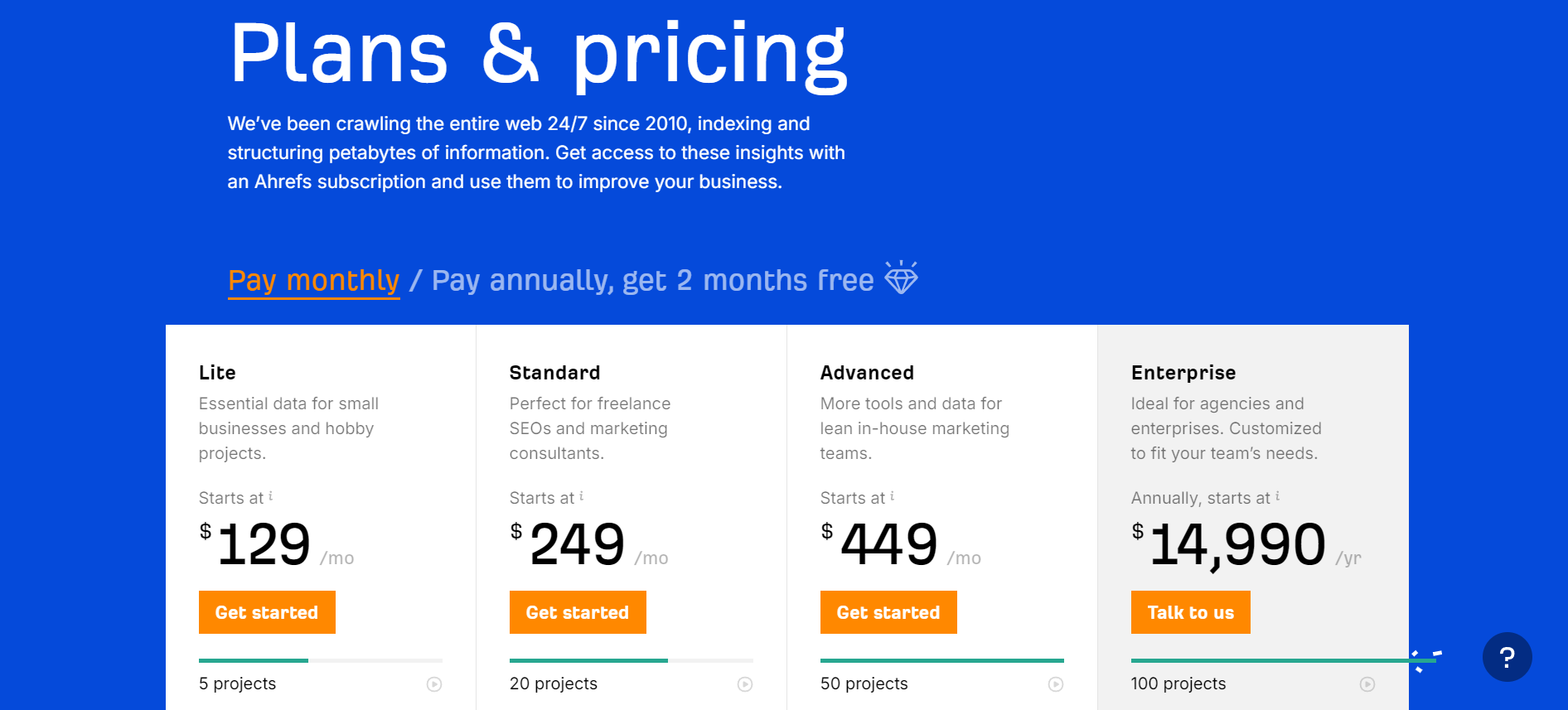
There’s also a free option called Ahrefs Webmaster Tools. This includes relatively limited access to the Site Explorer and Site Audit tools. For example, you’ll be limited to 5,000 crawl credits per month for each project. You can also only use the tools on sites you have verified ownership of, so no competitor analysis.
Ahrefs pros and cons
Ahrefs has a useful range of SEO features, but how does it compare to Semrush? Let’s take a look at Ahrefs’ main pros and cons.
Pros
- SEO tools: Like Semrush, Ahrefs’ customer reviews praise the search engine optimization tools, including for backlinks and competitor research.
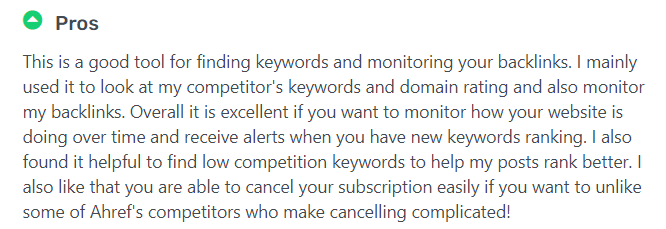
Cons
- Limited features: Although the SEO features are robust, users often found the best features were limited to the more expensive plans. Ahrefs also doesn’t cover many other aspects of marketing, as Semrush does, such as social media scheduling.

- Expensive pricing: Whilst Ahrefs doesn’t have the same level of paid add-ons as Semrush, it’s still a costly platform. That’s not helped by the “credits” system on the Starter and Lite plans, which can incur additional charges if limits are exceeded.

Semrush vs Ahrefs: Which is Best For Entrepreneurs?
Semrush and Ahrefs are both leading SEO platforms. Each has their own strengths and weaknesses.
The best platform for your business will depend on your budget, business type, and the features you most frequently use.
If you’re looking for a platform that specializes in SEO, with a slightly more reasonable price, Ahrefs could be the choice for you. With that being said, you’ll still need to keep an eye on the credits you’ve used, if you’re on one of the lower plans.
On the other hand, if you run an agency or want a tool that can take care of most aspects of your marketing, you’re better with Semrush. That’s down to its diverse add-ons and streamlined dashboard. However, make sure your budget can cover the costs, as the platform is very expensive.
Alternative SEO Tools to Leverage For Your Business
Keep in mind that Semrush and Ahrefs aren’t your only choices. There are other SEO tools to try out. For example:
- Ubersuggest: This is a keyword research tool that has a limited free plan. If you want to enhance the limits, then you can upgrade to a paid tier, which starts at $16 per month (paid annually) for the Individual tier. You can also buy the plan outright for $290.
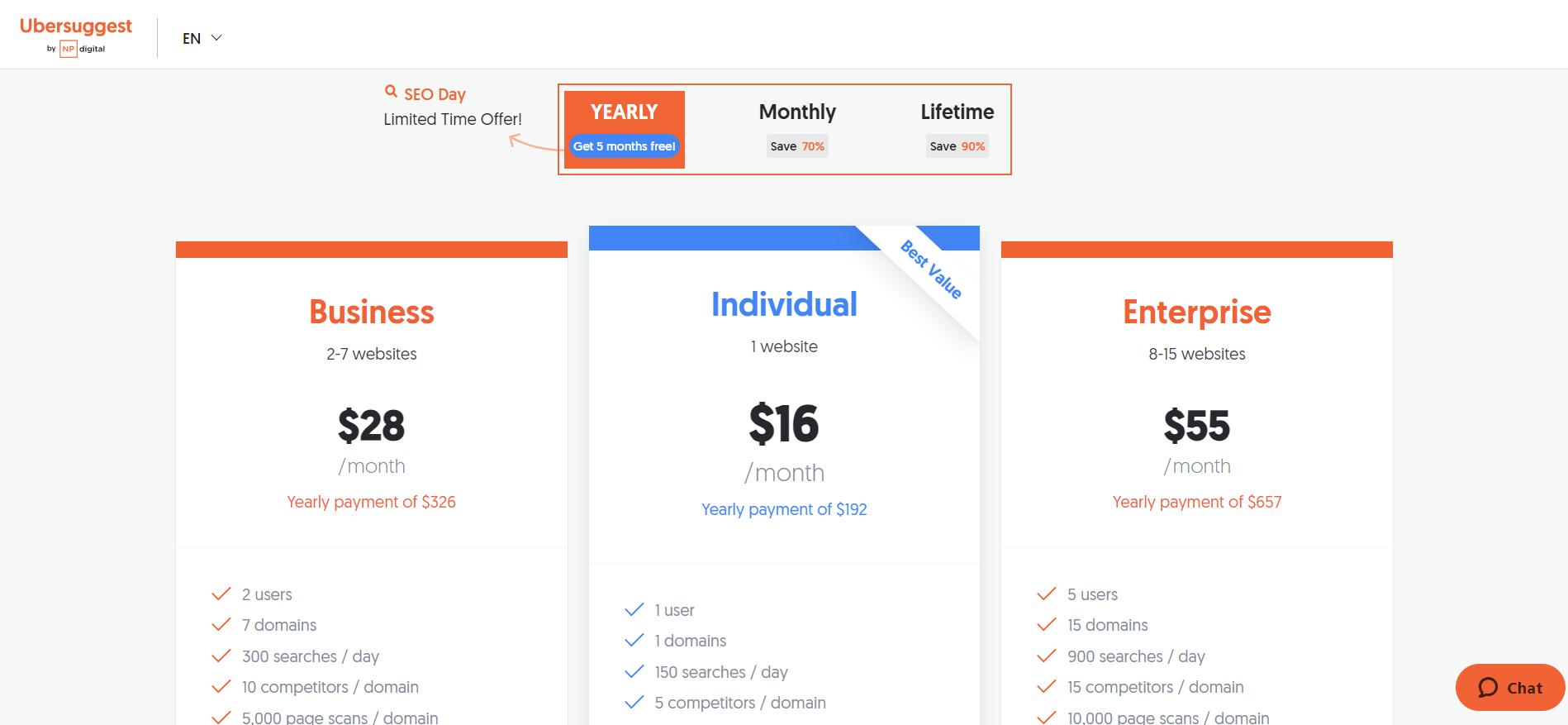
- Moz: This platform has several different tools, including a Pro plan with keyword research, site audits, and more. Moz Pro starts at $99 per month.
- Google Keyword Planner: You can use Google’s Keyword Planner tool for free, if you sign up for a Google Ads account. Don’t worry: this doesn’t mean you have to start an ad campaign, as you can skip any campaign creation prompts. Be aware that the tool is geared towards paid ads rankings, so is typically less relevant to SEO, though.
Find SEO and Marketing Advice and Education on Whop
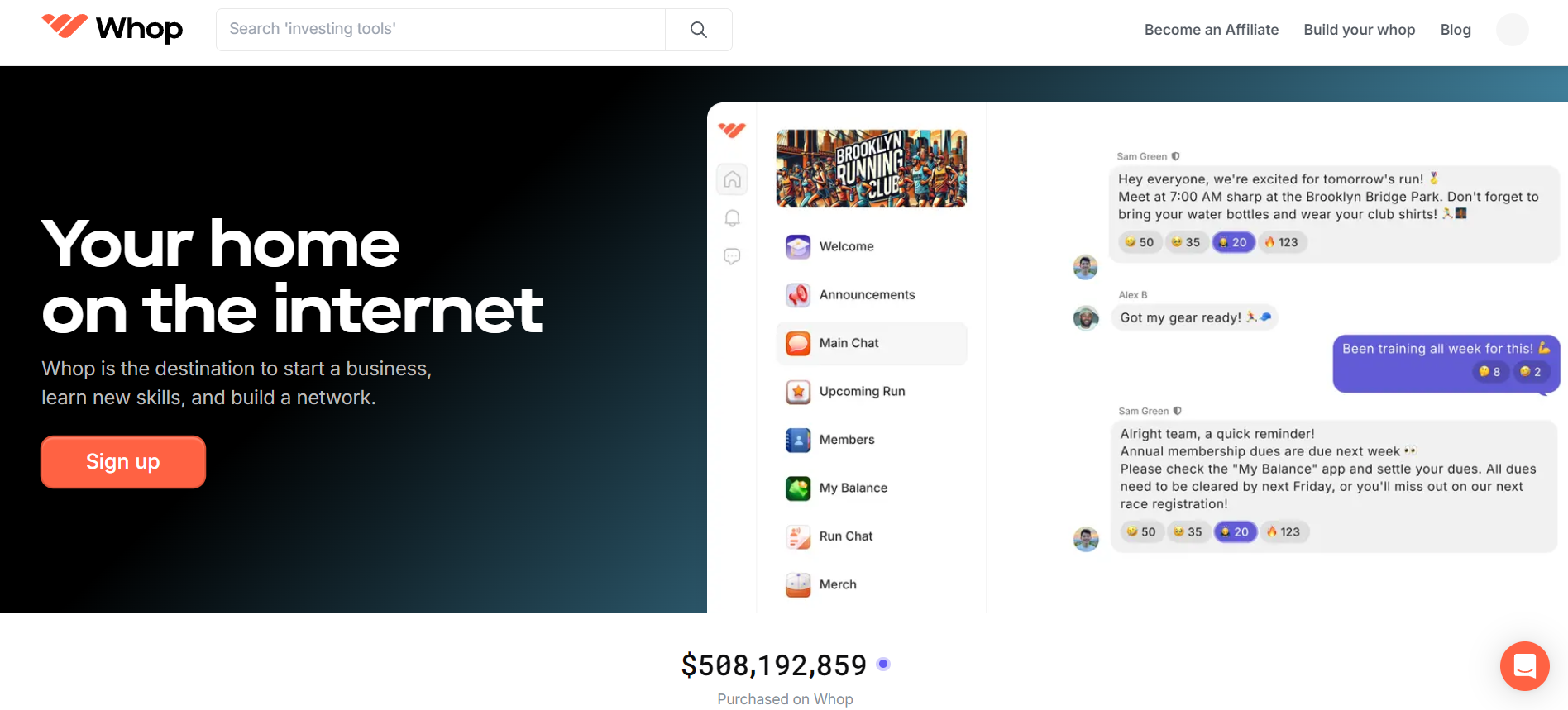
Whop is an all-in-one platform for learning and earning. You can create your own online business with Whop, but you can also find hundreds of communities, courses, and tools dedicated to teaching others the art of marketing.
From SEO-focused communities that outline how to get those high-rankings, to courses to teach you all you need to know about outreach, there's something for everyone on Whop.
